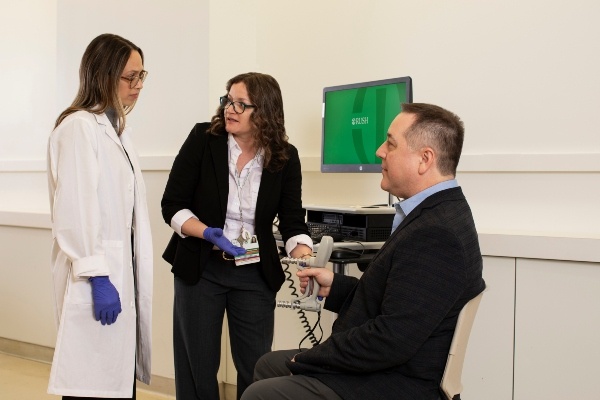Introduction
Our program trains clinical dietitians who improve patients’ nutritional health by addressing the relationship between food and well-being.
You will learn to work closely with patients and their health care teams to design individualized nutrition plans based on patient needs.
After earning your degree, you will eligible to take the National Examination for Registered Dietitian Nutritionists. Our graduates have a first-time pass rate of more than 95%.
Research is an integral part of the MS in Clinical Nutrition - Dietetic Integrated Track program. You have the opportunity to complete a research thesis, but it is not required.
This program is available on a full-time basis only.
Our approach
You learn from faculty who are also practicing dietitians at Rush University Medical Center, one of the nation’s top academic medical centers. Most of your clinical rotations will also take place at Rush.
Rush's campus offers a rich environment for learning. You work with professionals and students from all areas of medicine.
Our teacher-practitioner model integrated classroom education, research and community service with patient care.
All of your learning takes place in the dynamic city of Chicago, which is rich in culture and diversity. Chicago is home to many food and health care organizations, inducing the following:
- Academy of Nutrition and Dietetics
- American Medical Association
- Kraft
- McDonald’s
- National Restaurant Association
- The Joint Commission
You can also complement your learning with a variety of student life opportunities, with more than 30 student organizations to participate in.

This master's degree program, the MSDI Track, is designed for individuals interested in becoming Registered Dietitian Nutritionists (RDN). Students will complete supervised experiential learning and didactic coursework in the areas of food systems management, community nutrition, and clinical nutrition. After completing the requirements, students are eligible to take the National Examination for RDNs.
Rush's other clinical nutrition program, the Master of Science (MS) in Clinical Nutrition, is for individuals interested in the evidence supporting clinical nutrition practice. The didactic coursework within the curriculum focuses on assessing and applying current evidence-based nutrition information. That MS Track is ideal for RDNs interested in acquiring further training in nutritional science and research methods, dietetic interns seeking a master’s degree and current or future health professionals wanting to expand their nutrition knowledge.
MS in Clinical Nutrition - Dietetic Integrated Track program length and location
Our 21-month, 48-credit program takes place on campus. It includes clinical rotations and community service hours.
The majority of your rotations take place at nearby Rush University Medical Center, which shares a campus with Rush University.
You will also complete a master’s research project. After earning your MS degree, you are eligible to take the National Examination for Registered Dietitian Nutritionists.
MS in Clinical Nutrition - Dietetic Integrated Track program tuition
At Rush University, we know your education is a big investment. We want to make sure you have all the information to be able to make the best financial decisions for you and your family.
Tuition for the Master of Science (MS) in Clinical Nutrition - Dietetic Integrated Track program is $1,016 per credit.

Interested in becoming a registered dietitian? Learn about the coursework, supervised practice and credentialing exam required to take that next step in your career.
MS in Clinical Nutrition - Dietetic Integrated Track career opportunities
You will be prepared for a career as registered dietitian nutritionist in a variety of settings, including the following:
- Academics
- Federal or state agencies
- Public health
- Private industry
- Research
- Wellness
The average annual salary for dietitians was $61,650 as of May 2021, according to the Bureau of Labor and Statistics.
Salaries can vary greatly based on experience, location and specialty. The top 10 percent of earners in the field average more than $93,640 per year.
The Bureau of Labor and Statistics estimates a 7% increase in jobs for nutritionists from 2021 to 2031. About 5,600 openings for dietitians and nutritionists are projected each year, on average, over the decade. Employment opportunities are expected to continue to increase with more awareness about the link between nutrition and health.
Mark McInerney, PhD
Mark_C_McInerney@rush.edu
Learn about upcoming sessions and events in your field of interest.
Sign up to receive more information about this program.





















